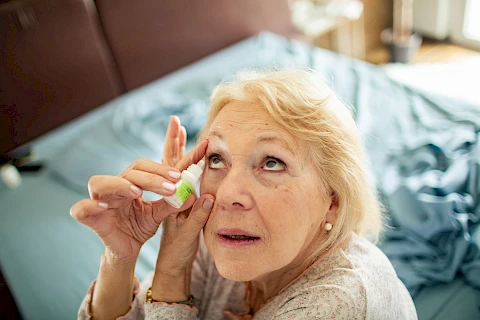
For seniors, eyesight isn't just about clarity. It also involves comfort and ensuring that any symptoms like itchiness are swiftly addressed. August is National Eye Exam Month, a timely reminder to focus on our eye health. This blog aims to provide caregivers with essential information on managing itchy eyes in seniors. Understanding how to care for itchy eyes can significantly improve a senior's quality of life.
Common Causes of Itchy Eyes in Seniors
Before you can help, you need to know what's causing the itchiness. Common culprits include allergies and dry eye syndrome. Seasonal allergies, such as hay fever, can cause itchy, red, and watery eyes in many older adults. Environmental factors like dust, pet dander, and pollen can also be significant triggers. Our eyes produce fewer tears as we age, leading to dry, irritated, and itchy eyes. Exposure to air conditioning, wind, or smoke can also contribute to dry eyes.
Medications can also cause itchy eyes. Certain medications, like antihistamines, decongestants, and blood pressure drugs, can cause dry eyes as a side effect. Be aware of eye-related symptoms like dryness or redness stemming from medication use.
Identifying Symptoms
Recognizing the symptoms is the first step in managing itchy eyes effectively. Watch out for redness and irritation, which are common signs that something is irritating the eyes. It could signal an underlying issue if the senior frequently rubs their eyes. Watery or dry eyes often contribute to a senior's discomfort, and any changes in vision clarity should be noted and monitored.
When to Seek Medical Attention
Sometimes, itchy eyes require more than home remedies. Seek professional help when symptoms don't improve with standard treatments or if there's extreme itching, pain, or redness. Any significant changes in sight should prompt a visit to an eye doctor. Signs of infection, such as pus, severe redness, and swelling, also necessitate medical attention.
Providing Relief
Fortunately, various methods can offer relief from itchy eyes:
- Over-the-counter eye drops, including artificial tears, antihistamine drops, and those specifically for dry eyes, can be effective. Follow the product instructions for optimal relief, applying a few drops in each eye several times daily.
- Warm and cold compresses can also help. Warm compresses can improve tear flow, while cold compresses can reduce swelling and itching. To apply them, use a clean cloth soaked in warm or cold water and place it on closed eyes for 5-10 minutes.
- Environmental adjustments can make a big difference. Adding moisture to the air with humidifiers can help prevent dry eyes. Keeping windows closed during high pollen seasons and regularly cleaning air filters can reduce indoor allergens.
Are You Prepared to Manage Itchy Eyes?
Managing itchy eyes in seniors involves understanding the causes, recognizing symptoms, and knowing when to seek medical help. Simple measures like using eye drops, applying compresses, and making environmental adjustments can offer significant relief. Regular eye exams are crucial for maintaining good eye health, especially as we age.
If you're caring for a senior in Lockhart, La Grange, Luling, Del Valle, or Elgin and need assistance, contact us. Senior Helpers San Marcos provides professional caregiving services and is here to improve the quality of life for our seniors.